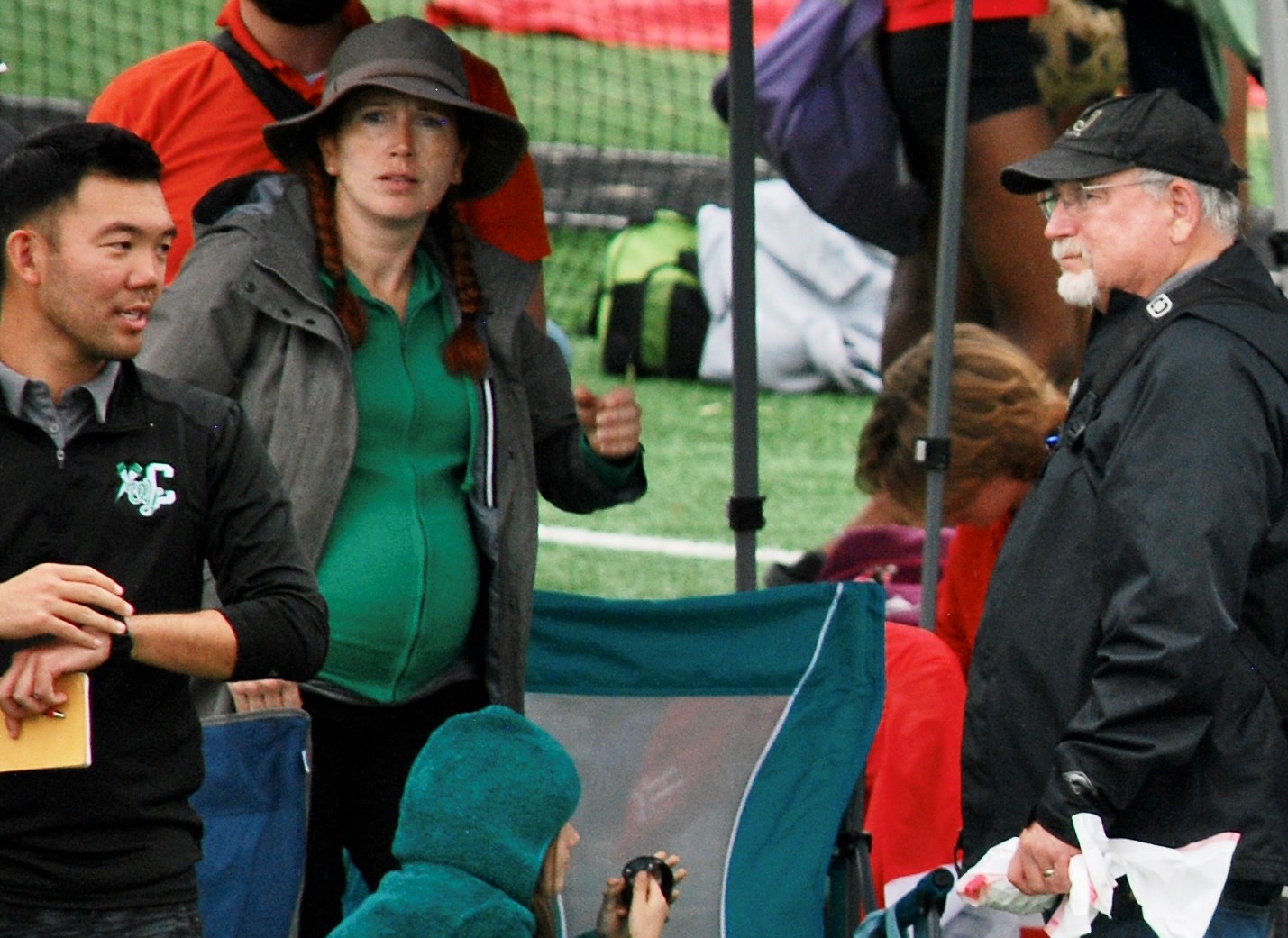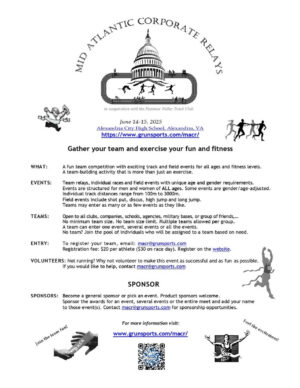
He didn’t run the day I moved in. Instead, we bought tuna steaks and grilled them with fresh pineapple in the park behind the house. “Wow,” I thought, “this is going to be great.” But the next day, after he came home from work, he laced up his sneakers and I didn’t see him again for an hour and a half. Then the next day, he put on his shoes and went out again. And on the third day, when I realized this probably wasn’t a phase, I asked him, “So you run every day?” Almost reluctantly, the man who would become my husband said, “Well, yeah, it’s what I do.” And, save for when he was sick or recuperating from another race, he’s run every day since for the past 10 years.
For better or worse, running has the ability to define a relationship. In the Washington area, where, regardless of the weather, you’ll always find runners pounding the trails or circling the National Mall, you can often see couples running together, maybe even pushing a jogging stroller to boot. For some, running can be a bonding experience, providing countless training hours and racecourses to be shared.
But for many others, there’s a hidden side to their habit – the partner, spouse, boyfriend or girlfriend who spends the mornings back at home, caring for the children, preparing the meals, or maybe just sleeping in. They’re the ones who wait for the workout to end, wondering when they can finally go to dinner. They’re the ones who silently think that you don’t actually need another pair of running shoes. And they’re the ones who, even though they love you, don’t understand what all the fuss is about.
In an asymmetrical running relationship, the non-runner rarely gets much attention. While the runner gets the medal, the t-shirt and maybe a new PR, the non-runner is in the background, holding the sign and taking the pictures, keeping the spare set of clothes warm and dry. But whether they’re a cheerleader or a Sherpa, the non-runner is an integral part of the running experience, and, even more importantly, to the runners themselves. We non-runners may not have a stack of medals, but it’s about time we got some of the glory too.
What you sign up for
So who are we, the non-runners in the relationship? We’re the ones who, bleary-eyed and gripping coffee, line the racecourse, cheering for our partners and holding up signs. We’re up early on race day, taking care of the kids and making sure there’s a new stick of BodyGlide in the car. We’re happy when there’s a new PR, and consoling when the day doesn’t go as planned. And we’ve come to accept the sport’s staggering expense – in money that will be spent on shoes and entry fees, and in time that will be devoted to logging miles.
After all, when you love a runner, you have to be prepared to make sacrifices. There will be countless canceled Saturday night plans when a particularly tough long run is scheduled for Sunday morning. Even on vacation, the runner is going to run, so if you signed up for the sunrise tour of the Grand Canyon, you’ll probably end up going by yourself – the runner will already be awake, exploring the running trails on their own. And, when you see all those happy couples at weekend brunch, you’ll stare at them from the other side of the road as your hold your runner’s backpack at another 5k.
But the runners are making sacrifices, too. When Joel Rivera, 36, of Ashburn, and his wife, Mayra Vargas, had their first child, Rivera knew that balancing running with work and a growing family was going to be more difficult than before. So the 3:06 marathoner started a new habit of waking up at 5 a.m. to ensure that he could fit a run into his day. And he’s more willing now to compromise when family commitments force him to cancel a workout. Though it used to bother him, Rivera knows that missing “one day of training will not make me or break me.”
This wasn’t always the case, however. Rivera also admits that he almost brought his running gear along to the hospital for the birth of their daughter. “I was training to complete my first marathon at the time and didn’t want to skip a training session,” Rivera said. His wife “didn’t take it too well.”
Running can also bring couples together, even if only one partner crosses the finish line. Leah Kasowitz, 33, an ultramarathoner from Southwest Washington, said her fiancé John Pan “takes pride in being the best Sherpa he can be.” “He loves cheering other runners along at races by holding signs, ringing cowbells and carrying everyone’s dry clothes for later,” she said. Pan is such a trooper that “he will wake up at 5 a.m. to drive with me to a race, even in below-freezing temperatures.” For longer races, like the Seashore 50k in Virginia Beach where Kasowitz scored her PR of 5:24, Pan has also been known to volunteer at aid stations that need a helping hand.
But Kasowitz is hardly the only person benefitting from her sport. Kasowitz said Pan “enjoys his quiet time” after Kasowitz goes to bed every night at nine p.m.
For Jennifer Forman, 36, of Gaithersburg, the 3:52 marathoner said that running has improved her life and her relationships with her family in more ways than one. “Running helped me lose nearly 100 pounds as I was preparing for my wedding,” Forman said. And, by helping her clear her head and de-stress from the day, running has made her “a better person,” she said. Now Forman runs to stay fit and healthy, as well as to be a role model for her two young sons.
Her husband, Ryan Forman, also runs two to four times a week, usually on the treadmill in their basement. But you won’t see the husband and wife completing races together any time soon. Forman said Ryan “doesn’t feel the need to compete with anyone” and “prefers to work out in the comfort of our home.” But that doesn’t stop him from supporting Forman at her races, even under dramatic circumstances. After spending the night celebrating at his friend’s bachelor party, Ryan still made it to Pennsylvania when Forman raced the Philadelphia Marathon in 2013. “He went to his friend’s party, which ended very late, came home, packed up the kids, and drove to Philly – on no sleep,” she said. “He stationed himself with my sons right at the half marathon point, and was positioned at mile 26 to cheer me on.” Forman couldn’t be more grateful for her husband’s support. “He’s my biggest cheerleader and I love him for it,” she said.
But running can also drive couples apart. The long hours spent training, the new groups of running friends, and the experiences that only the runner is having can sometimes cause tension and heartache. Melissa Hutchinson, 38, of Clarksburg, Md., wishes her husband Taran would run, if only to understand why Hutchinson, whose 5k PR is 22:54, loves the sport. “I run to feel good, to stay in shape, to help with my anxiety and depression, for fun, and for the bling,” she said. She’s also friends with several couples that run together, and wishes that “we had something like that to share.” But Taran simply isn’t interested. “He’s a bigger guy, so it’s harder for him, I think, but he just doesn’t seem to get the same experiences or feelings I do out of it,” Hutchinson said. Still, “I know he’s proud of me,” she said. “I just wish he were at the finish line cheering me on sometimes.”
There are also plenty of runners in the area who would love to have their partner join them on runs, but that’s not always possible. Joel Rivera’s wife Mayra has tachycardia, a condition where the resting heart rate is faster than normal, and running is not recommended. And for others, like Angie Wilcox’s husband Ted, running can sometimes be boring and painful. Wilcox, 35, of Silver Spring, has been running for fourteen years, and she proudly “beat Pamela Anderson” in the New York City Marathon in 2013. But Ted won’t be joining her any time soon. He “thinks running is boring,” Wilcox said. “He doesn’t enjoy the monotony and finds it physically uncomfortable.” Still, Ted is “very supportive and almost always will be out cheering me on in a race,” Wilcox said. “And he got a nice tour of New York City while following me at the marathon!”
Edward Dudlik’s wife feels similarly. Dudlik, 33, of Glover Park, is a 3:11 marathoner, and his wife Merasi understands “how important running is to my overall happiness and sanity.” But Merasi “just doesn’t get any enjoyment from running,” Dudlik said. “It’s not her thing.” She stills supports him at his races, though, and may get carried away, sometimes literally, on the course. “I had signed up for the Savageman, the world’s hardest half Ironman,” Dudlik said, “and by the time I got to the second lap of the run, I was pretty trashed. I was just determined to finish, so when I saw Merasi on the side of the road, I decided to do something goofy.” Dudlik called Merasi over and then scooped her up, carrying her, fireman style, down the road. “Let’s just say it seemed like a good idea at the time,” he said.
Quid Pro Quos Where You Can Get Them
As for me, I would run with my partner, but I’m afraid I can’t keep up. My husband, Dickson Mercer, is a 2:29 marathoner who considers running second only to breathing as a necessity of life. There are times when he tops one hundred miles a week. And no matter where we are – West Africa with the Peace Corps, Paris on vacation – the daily run must be had. “I can’t just take a zero,” he explains.
But I’ve just gotten into the sport, finishing this year’s cold and wet D.C. Rock and Roll marathon in 3:51, with Dickson cheering me along the entire way. Before I began running, I could never understand what Dickson meant by the pain and nausea he felt “in the twenties,” or why it seemed like fun to sign up for a race months in advance and plan the rest of your life around that event. But now I do, and it’s something we can share as we drive out for our Sunday long runs, or guiltlessly eat pizza when the marathon is complete.
And while I still don’t plan on putting in 100-mile weeks or running on vacation when there are beaches and margaritas to be had, there is something about sharing the sport that lets Dickson and I connect on a new level. I’m so proud of what Dickson does, and I know that he’s proud of my accomplishments too, no matter how much they pale in comparison to his own.
So, as a non-runner who is slowly metamorphosing into a runner myself, I’ll still be there at the end of his race, holding Dickson’s backpack and a set of dry clothes. I’ll be there, surrounded by my fellow non-runners, as we cheer on the finishers, ringing our bells and holding our signs. We’ll do this because we know what it means, both for us and for the person we love. And together, we’ll wait for that moment when the race is over and our partner crosses the finish line, gets their medal, and walks over to wrap us in a big, sweaty hug.
I’ll do this at every race Dickson runs. Unless, of course, I’m running it too.
Recent Stories
Looking for our race calendar? Click here Submit races here or shop local for running gear
Hero Dogs 5K9
Hero Dogs Inc will host its 5th Annual 5K9 race at the Congressional Cemetery on Saturday, May 17th, beginning at 8 am. There will also be a 1K Fun Run. The 1K Fun Run will start at 8 am sharp
Mid Atlantic Corporate Relays
Team relays, individual races and field events with unique age and gender requirements. Events are structured for men and women of all ages.
Some events are gender/age graded. Individual track distances range from 100m to 3000m.
Field events include shot






